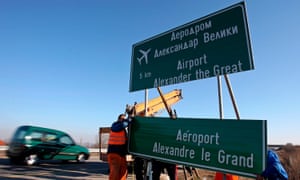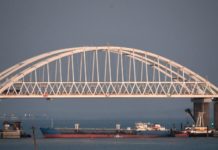Greece welcomes Macedonian move to settle name dispute
Helena Smith in Athens
Balkan state considering alternative names such as Upper Macedonia or New Macedonia.

Greece has welcomed an announcement by the Macedonian prime minister that his country is willing to change its name, in a sign that one of the world’s most vexing disputes could soon be solved.
Athens described Zoran Zaev’s readiness to add a geographical qualifier as “a positive step” that would dispel fears of territorial claims over Greece’s adjacent region of Macedonia.
Among the new names being considered are Upper Macedonia, New Macedonia, Northern Macedonia and Macedonia (Skopje), according to well-placed diplomats.
“This is an important development,” said the Greek foreign ministry in a statement released shortly after Zaev said the Balkan state would also rename its airport and national motorway.
“We hope that it marks the start of a new chapter in the relations between our two countries and peoples.”
Compromise is unpopular in sections of Greek society. On Wednesday, the Greek Orthodox church held an extraordinary meeting of its governing synod to discuss the name issue.
Clerics were among the hundreds of thousands of people who protested in Athens on Sunday over the prospect of a solution that would include the word Macedonia.
The region of Macedonia, formerly part of the Ottoman empire, spreads across Greece, Bulgaria and the former Yugoslav republic of Macedonia. Athens has objected to its northern neighbour’s use of the name since it proclaimed independence in 1991, arguing that it projected irredentist ambitions.
Addressing reporters late on Tuesday, Zaev said the country’s Skopje Alexander the Great airport would henceforth be known as Skopje international airport, and its main road route to Greece would drop a similar moniker and be called the Friendship highway.











